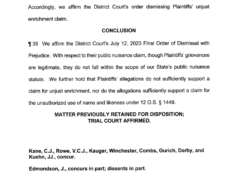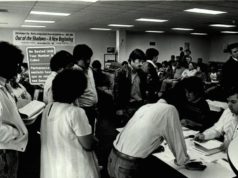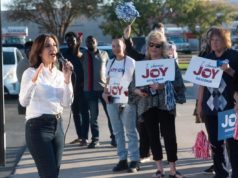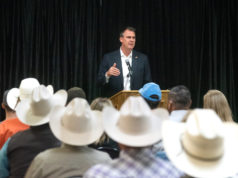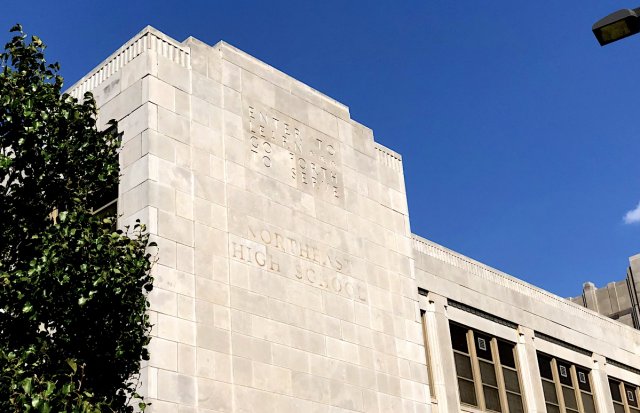
Only a couple of weeks before the scheduled start of its academic year, Oklahoma City Public Schools announced it was opening Putnam Heights Academy, the new home for the closed Seeworth alternative school program.
The same day, OKCPS board member Charles Henry, Rep. Ajay Pittman (D-OKC), Rep. Jason Lowe (D-OKC) and community leaders held a press conference condemning the school name change accompanying the closure of Northeast Academy and relocation of Classen SAS High School to the Northeast building.
These conflicts come at the tail end of what Superintendent Sean McDaniel calls “an unbelievable lift to get schools ready so that our kids can enjoy that first day.” They also raise the question about what our community is really fighting over.
‘The culture and the name mean something’
It’s complicated, but these two battles boil down to a dispute over how patrons and communities express their love for their schools.
Given the challenges facing OKCPS, it makes no sense to argue over these deep emotional attachments for public schools. Such commitments should be seen as assets, not battlegrounds.
As the Oklahoman reported from Henry’s press conference, he argues: “It’s not fair for a school on one side of the community to come to a school on this side of the community, which is the Northeast community, which is a predominantly African American community, and strip us of our culture. The culture and the name mean something to us.”
And yet the district is trying to move the case to federal court.
Seeworth issue remains unclear
Less is known about the Seeworth controversy. McDaniel couldn’t say why the Seeworth board didn’t relinquish the old school’s lease, resulting in the changes in location and the name. He speculated that something “might transpire in the next year or two years where they need that property.”
McDaniel acknowledged Seeworth’s other motivation: “That community, that group of parents and kids, collectively put 25 years into that program — their heart and their soul.”
Given the hurried OKCPS timeline, the district doesn’t have the luxury of putting last-minute preparations for the beginning of class on hold. But immediate steps should be taken to defuse these and similar controversies. All parties need to call a timeout.
Differing sides must return to their corners. An immediate commitment to de-escalation must be made. After a truce is declared and the last steps are taken for starting the school year, the community conversation which preceded the Pathway to Greatness must be reset.
Compromise a good direction
Although I read the evidence presented by the OKCPS differently, there is merit in its positions. But here is my first concern. Whether we are talking about closures, charter applications, grade-level reorganizations or school names, the OKCPS may be right or it may be wrong, but it has made extremely close calls. Often, if you accept the district’s arguments, it seems like the facts come down something like 51 to 49 percent in their favor. Given the deep feelings of their opponents, a recalculation is in order.
Public education, like our democracy, requires compromise. A leader might believe that his or her policies are better, but that is not enough of a reason to discount the public’s views when patrons see a situation differently.
I have no doubt OKCPS leaders honestly and sincerely concluded that their plans made more sense than the arguments of those who opposed them during the Pathway to Greatness community meetings. But even if you accept the merits of the unpopular positions they settled on, it should be remembered that education administrators do not hold a monopoly on wisdom. It’s always possible that the judgments of families and their neighbors are as valid, or more valid, than those of experts.
Were I a district leader, I would do my best to avoid distractions while getting schools off to a good start this month, but I would call for a compromise. It is too late now, but the most doable action would have been to reverse the name-change decisions regarding Classen SAS and Seeworth. Such a genuine act of bridge building would likely have been enough to get the new Classen/Northeast school off to a good start.
The Seeworth controversy is more complicated, and the stakes could be higher. If Seeworth/Putnam Heights can’t effectively serve at-risk kids, the learning environments in high-challenge neighborhood secondary schools will soon suffer as the alternative school option declines. The OKCPS needs the wisdom of Seeworth educators and board members like Sen. Kay Floyd (D-OKC), Judge Barbara Swinton, and LeeAnn Wilson. A show of respect for the school’s name could be a step toward listening to their hard-earned experience, and the cooperation that it encourages could make it easier to work through future problems.
District needs to mend some fences
A commitment to compromise with the Seeworth and Northeast communities could help rebuild the district’s credibility in terms of the controversies with Harding Fine Arts and Western Gateway. In both cases, both sides have made good points, and the evidence isn’t clear cut. The best outcomes would require ongoing collaborative processes.
Across the nation, public education supporters feel disrespected. It’s no surprise that these feelings are especially intense in neighborhoods where people of color haven’t received the respect they deserve. But whether we are talking about the daughter of an Oklahoma Supreme Court justice and other leaders who have dedicated themselves to a school serving our most-challenged students, or about the community leaders fighting for Northeast’s heritage, such devotion to public schools deserves respect.










